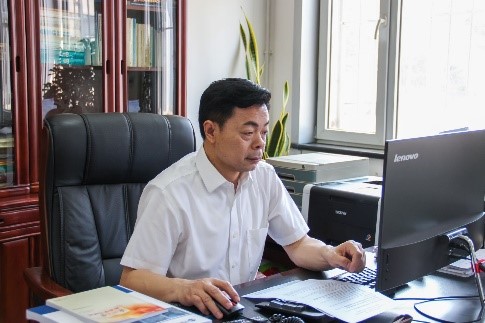Professor Xiating Feng: Deep into the Earth--Interview by Guangming Daily,China
发布时间:2020年09月17日
浏览数:5067

"Deep into the earth" is more difficult than "mount up to the space". It's more deep and more dangerous. The most common geological phenomenon is rockburst induced by construction, which can reach a magnitude of 4.6 in severe cases. The powerful energy released can turn a small stone into a "bullet" in an instant. Professor Xiating Feng said: "Engineering construction continues to go deep into the earth. Disasters such as rockburst not only delay the construction period, but also hurt people and equipments. We have to solve these problems."
In 1982, Xiating Feng, a farmer's son from the Qianshan (Anhui province) was admitted to the Northeastern University of Technology with a major in mining. During his postgraduate studies, he studied under Professor Lin Yunmei, the "first person" who introduced rock mechanics to China, and started a long scientific research career in the field of intelligent analysis methods and engineering applications of rock mechanics. Professor Xiating Feng recalled, "My tutor had a great influence on me. In 1994, she organized the first International Conference on Rock Mechanics at Northeastern University, which opened up our international horizons." It was under the guidance of Professor Lin Yunmei that Professor Xiating Feng became the one of the scholars who put forward the theoretical system of " intelligent rock mechanics" in China.
In 2008, the Jinping II Hydropower Station, a landmark project of "Power Transmission from the West to the East", started to build the long and deep-buried diversion tunnels. The average tunnel line is 16.67 kilometers long and the maximum buried depth is more than 2500 meters. It is one of the most difficult hydraulic tunnels in the world. The construction process has a very high risk of rockburst. Professor Xiating Feng went to the first line, slowly understood the "temper" of the violent destruction of the surrounding rock of the deep engineering, mastered the control measures, and applied the laboratory results to the site with intense rock bursts. He finally conquered this worldwide deep engineering problem at one stroke.
"After nearly 4 years of efforts, we introduced microseismic monitoring technology into this project and made a full-body CT scanning for the tunnel to determine whether an operation is needed." Professor Xiating Feng introduced that with the unremitting exploration of his team, qualitative warning of rockbursts has been upgraded to quantitative warning of levels and locations. It can be accurate to days or even hours.
Bayu Tunnel, the control project of Lhasa-Nyingchi section of Sichuan-Tibet Railway, is located at an altitude of 3,500 meters and in the plate suture zone. It is the world's severe rockburst railway tunnel. During the construction, in the most serious situations, this tunnel once encountered 20 rock bursts every day, and the excavation trolley weighing up to 4 tons was shaken out of the tunnel, known as the "stone shell tunnel". The engineering side has replaced 7 construction teams successively. . Professor Xiating Feng led his team into the construction site for continuous on-site monitoring lasting for 918 days using the self-developed high-precision rockburst monitoring and warning system. As a "stethoscope", the system was installed in the railway tunnel to support the personal safety of the construction personnel. Thanks to the accuracy of monitoring and early warning, there were no casualties caused by rock bursts in the monitoring area, and the construction efficiency increased by 20%.
The road to the deep earth is full of thorns, and it is not easy to understand the "pulse" of the underground rocks. The underground working conditions are very difficult, 40 kilograms of monitoring equipment needs human transportation, and it is not unusual to hike tens of thousands of meters to debug equipment. "No matter how difficult conditions are today, it is still much better than 60 years ago. Back then, the older generation from Northeastern University rushed to the front line without hesitation in line with the concept of "national needs are the direction of our efforts", leaving us precious spiritual wealth. We should insist on this spirit and stick to the original aspiration of the older generation of mining people." Professor Xiating Feng said.
The NEELUM-JHELUM hydropower project in Pakistan is an important project in the construction of the "Belt and Road". On May 31, 2015, an extremely strong rock burst occurred, and the construction work was stopped and repaired for half a year. Professor Xiating Feng led his team to timely and accurately predict the potential rockburst area and level during the tunnel excavation, so as to provide a scientific and technological guarantee for the safety of construction personnel and equipment.
When the COVID-19 outbreak hit, Professor Xiating Feng led his team to collaborate on scientific research online. "Regardless of the impact of the epidemic, it's all the more important for us to tackle these challenges, unswervingly follow the path of independent innovation and build China into a scientific and technical power nation" In the view of Professor Xiating Feng, it is a lifelong responsibility of a scientist to do something meaningful and valuable for the practical purpose of solving the country's problems.









 中国岩石力学与工程学会微信订阅号
中国岩石力学与工程学会微信订阅号
 科普岩石力学与工程
科普岩石力学与工程